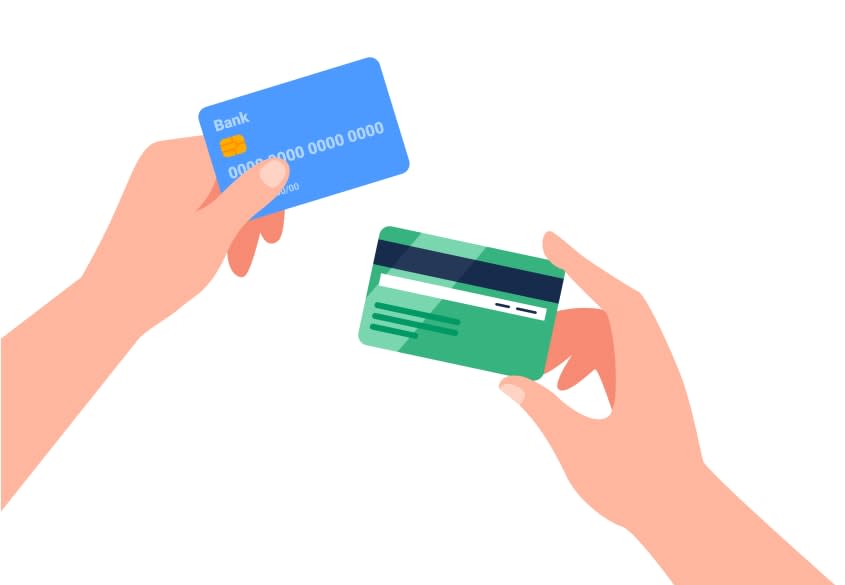How upgrading your credit card could unlock new perks

You may not give much thought to whether or not you're using the right credit card. But it's worth considering. Your credit profile and spending habits will likely change over time, and "if you've stuck with the same card for a while, you might be missing out on rewards and benefits that can add up to hundreds of dollars in value every year," said CNBC Select.
But the problem with applying for a new credit card is that your credit score will get dinged from a hard inquiry, and you'll lose the history (and likely rewards) you've built up with your existing credit card account.
Another solution worth considering is a credit card upgrade.
When you upgrade a credit card, you're requesting a product change to your existing credit card. You'll keep the same account with its full history and credit limit, just tied to a different card, and you'll skip the negative impacts that opening (or closing) a credit card account can have on your credit score. Plus, if you've accrued any rewards, you won't have to forfeit those (though you will miss out on new user signup bonuses that other credit card companies might be offering).
When does upgrading make sense?
Wondering whether it's time for you to take a step up with your credit card? Here are some instances where an upgrade can be the right step:
You have a starter credit card. Everyone has to start somewhere, but the first cards we secure as credit newbies generally aren't the best on the market. If you've been responsibly using your credit card for a while and have started to build up a credit history, you might consider upgrading. This will likely allow you to earn more lucrative rewards and take advantage of better benefits.
Your credit score has improved since you opened your card. Better credit scores generally open the door to better credit cards that offer more generous rewards and benefits.
Your spending habits have shifted. Maybe when you first applied for your credit card, most of your spending was on travel, but now, you're a parent running through tanks of gas dropping kids off at sports practice and stocking up at the grocery store. "Depending on how you spend your money and what you redeem it for, different cards work best for different people," Kendall Meade, certified financial planner at SoFi, told Fortune. "For some, a travel card will give them the most bang for their buck, while for others a flat cash back card would be more beneficial. It is important to sit down and look at your current spending habits and lifestyle to see what type of card will work best for you."
You're being offered an incentive to switch. Sometimes "credit card companies may try to entice you to upgrade with an incentive bonus worth a few thousand points or miles," said Nerdwallet. This could make it worthwhile to switch. Before you do, check whether that new card also comes with a higher annual fee. "Doing the math to see whether the bonus plus the card's higher ongoing rewards rate will offset a potentially higher fee," Nerdwallet said.
When you apply via our links we may earn an affiliate commission.
Does it ever make sense to downgrade your credit card?
A credit card downgrade is effectively the inverse of an upgrade — you switch your existing card out for a lower-tier card. And in certain cases, requesting a swap in this direction can absolutely make sense. For example:
You don't want to keep paying an annual fee. "There's little reason to keep paying an annual fee when you rarely use a card and you cashed out any earned rewards a long time ago," Nerdwallet said. By downgrading, you can pocket the amount you'd otherwise put toward paying a card's annual fee.
You want a lower annual percentage rate (APR). Usually, more lucrative rewards credit cards come with higher APRs. If you know you're planning to carry a balance and you're not using those rewards to their fullest potential, downgrading to a more basic card with a lower APR can make sense.
How do you upgrade (or downgrade) a credit card?
Start by figuring out if you're eligible. The best way to do so "is to call the number on the back of your card and ask," explained Credit Karma.
Different card issuers will have their own policies regarding product changes. As a general rule of thumb, "credit card issuers may be more willing to accommodate customers whose accounts are in good standing," Credit Karma added. Factors like "your credit reports and scores, payment history, spending habits, debt, income, employment and overall banking relationship" may be considered when assessing your request.
In some cases, there might be limitations on which cards you're able to switch to. For instance, "American Express only allows you to upgrade (or downgrade) to a card that offers the same rewards currency," CNBC Select noted.
If you are eligible and you're happy with the switch being offered, the process from there is pretty straightforward. Meade told Fortune that usually the cardholder will simply need to "agree to the new card terms and conditions and have the card mailed to them."
Becca Stanek has worked as an editor and writer in the personal finance space since 2017. She has previously served as the managing editor for investing and savings content at LendingTree, an editor at SmartAsset and a staff writer for The Week.
You may also like
Florida construction and agricultural workforces diminished after new immigration law takes effect
Judge limits how Biden officials can communicate with social media companies
How solar and wind energy are saving Texans from a record heatwave

